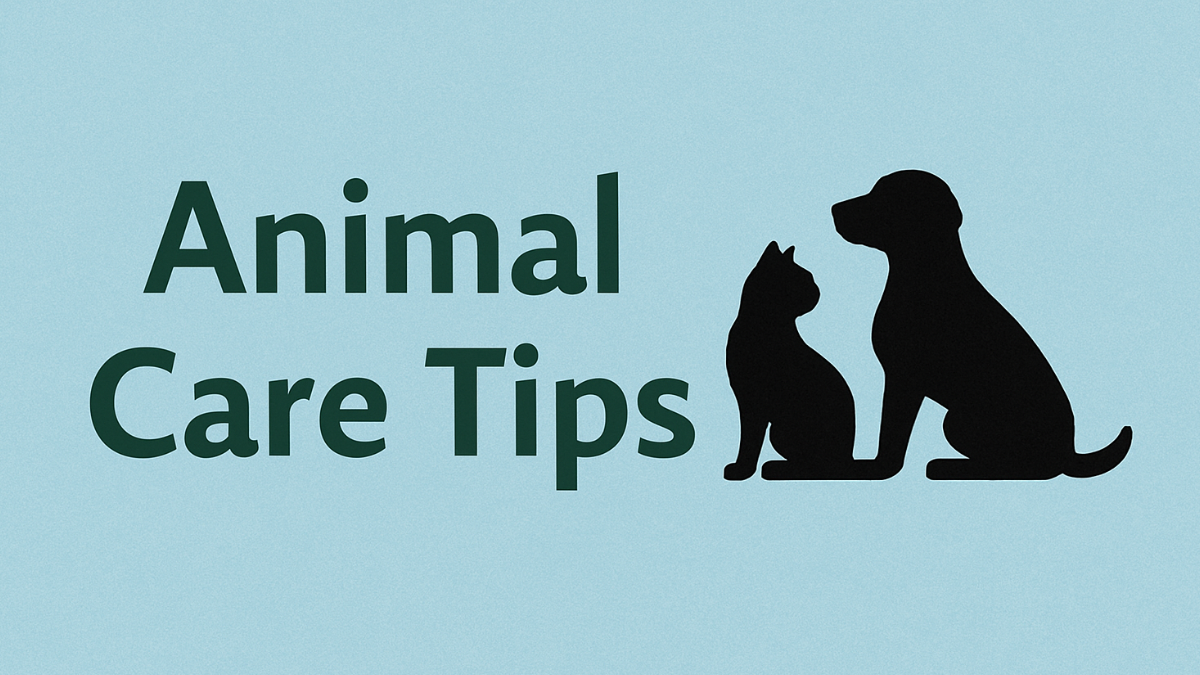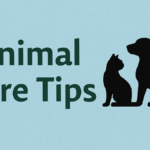Animal Care Tips are essential for every pet owner who wants to ensure their furry, feathery, or scaly companions live happy, healthy, and fulfilling lives. Whether you own a dog, cat, bird, rabbit, reptile, or any other animal, responsible care goes far beyond just feeding them. It involves meeting their physical, emotional, and environmental needs while providing love and safety.
In this guide, we’ll explore 20 essential animal care tips that every pet owner should know. These tips cover nutrition, grooming, mental stimulation, safety, and veterinary care — all of which contribute to your pet’s well-being.
Why Animal Care Tips Are Important

Pets depend entirely on their owners for survival and comfort. Following proper animal care tips not only prevents illness and behavioural problems but also strengthens the bond between you and your companion. Good care also ensures your pet lives a longer, happier life.
Top 20 Animal Care Tips for Every Pet Owner
1. Provide a Balanced and Nutritious Diet
Every pet requires a diet suited to their species, age, and health condition. Choose high-quality commercial food or vet-approved homemade recipes. Avoid feeding harmful human foods like chocolate, onions, grapes, or anything high in salt and sugar.
2. Always Supply Fresh, Clean Water
Water is as important as food. Change it daily and ensure your pet’s bowl or water bottle is cleaned to prevent bacterial growth.
3. Schedule Regular Veterinary Check-Ups
Routine health checks help detect early signs of illness. Most pets benefit from annual vet visits, while some may require more frequent care.
4. Keep Up with Vaccinations
Vaccines protect your pet from serious diseases. Follow your veterinarian’s recommended vaccination schedule to ensure your pet stays healthy.
5. Provide Daily Exercise
Exercise prevents obesity, boosts mood, and supports overall health. Dogs may need walks, cats love climbing and chasing toys, and small pets enjoy supervised play.
6. Create a Safe Living Environment
Pet-proof your home by removing hazards such as electrical cords, toxic plants, small choking hazards, and unsafe chemicals.
7. Offer Mental Stimulation
Boredom can lead to destructive behavior. Provide puzzle toys, training activities, or interactive games to keep your pet’s brain active.
8. Groom Your Pet Regularly
Grooming helps maintain a healthy coat, prevents matting, and allows you to check for parasites or skin issues. Include brushing, nail trimming, and ear cleaning in your routine.
9. Keep Sleeping Areas Clean and Comfortable
Wash bedding regularly, provide soft cushions, and ensure your pet’s rest space is free from drafts and extreme temperatures.
10. Learn to Read Your Pet’s Body Language
Understanding signs of fear, happiness, stress, or illness helps you respond appropriately to your pet’s needs.
11. Socialize Your Pet Safely
Introduce your pet to various environments, people, and other animals to build confidence and reduce anxiety.
12. Prevent Parasites Year-Round
Use vet-approved flea, tick, and worm prevention products regularly to protect your pet’s health.
13. Avoid Overfeeding and Treat Overuse
Measure portions carefully and use treats for training rather than as frequent snacks.
14. Provide a Designated Resting Space
Every pet needs a quiet place where they can relax without disturbance.
15. Use Positive Reinforcement for Training
Reward good behavior with treats, praise, or playtime instead of punishment.
16. Keep Identification Updated
A collar with an ID tag and a microchip can help reunite you with your pet if they go missing.
17. Prepare for Emergencies
Keep a pet first aid kit at home and know basic emergency procedures. Have your vet’s contact information readily available.
18. Respect Your Pet’s Natural Behaviors
Cats need scratching posts, dogs need to chew, and birds need space to fly or perch. Encourage these instincts in safe ways.
19. Reduce Stress and Noise Levels
Avoid exposing your pet to loud, chaotic environments. Provide comfort during storms or fireworks.
20. Give Daily Love and Attention
Time, affection, and bonding are vital for emotional well-being.
How to Apply Animal Care Tips in Daily Life

Create a Care Routine
Establish fixed feeding times, daily exercise sessions, and weekly grooming schedules.
Track Health and Behavior Changes
Keep a record of vet visits, vaccinations, and any changes in eating or activity levels.
Dedicate Quality Time
Bonding activities like playing, grooming, and training improve trust and happiness.
Animal Care Tips help pet owners keep their animals healthy, happy, and safe by focusing on nutrition, exercise, grooming, and emotional well-being.
Also Read : The Role Of Animal Nutrition In Enhancing Immune System Function
Conclusion
Providing proper care for a pet is a commitment that requires love, patience, and responsibility. By following these animal care tips, you ensure your pet enjoys a healthier, longer, and happier life. Remember, good care means meeting your pet’s physical, mental, and emotional needs every single day.
FAQs
1. How often should I take my pet to the vet?
Most pets need an annual check-up, though senior animals or those with health issues may require more frequent visits.
2. Can I feed my pet homemade food?
Yes, but it must meet nutritional requirements. Always consult your veterinarian before switching diets.
3. What’s the best way to prevent fleas and ticks?
Use vet-approved preventatives regularly and maintain a clean home environment.
4. How do I know if my pet is unhappy or stressed?
Look for changes in appetite, behavior, or body language, such as hiding, growling, or pacing.
5. Is exercise really necessary for small pets like rabbits or guinea pigs?
Absolutely! All pets need physical activity for their health and well-being.





